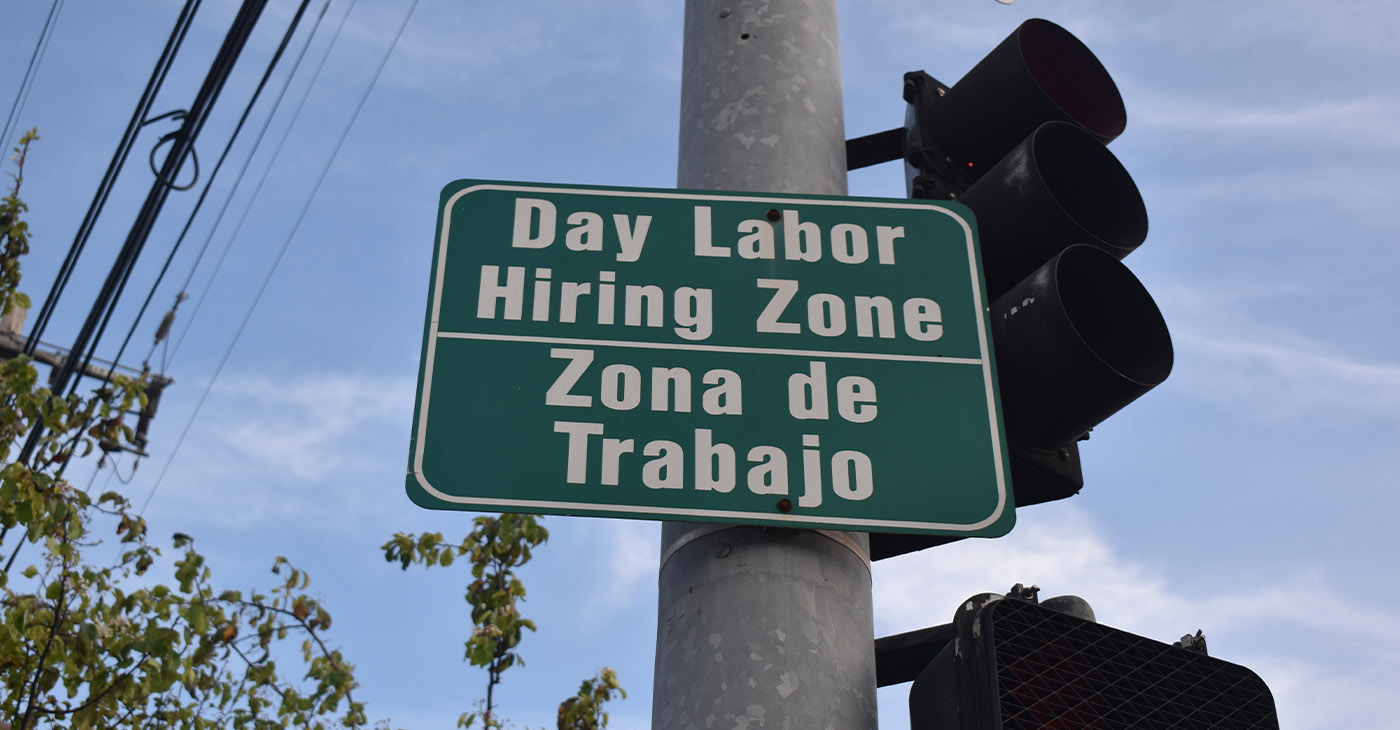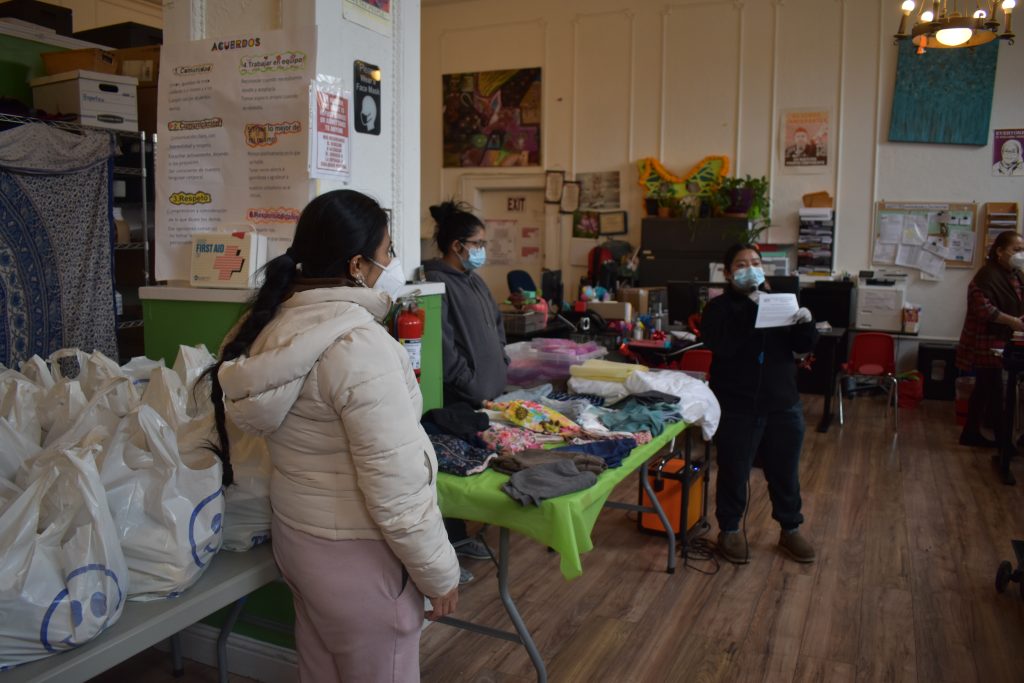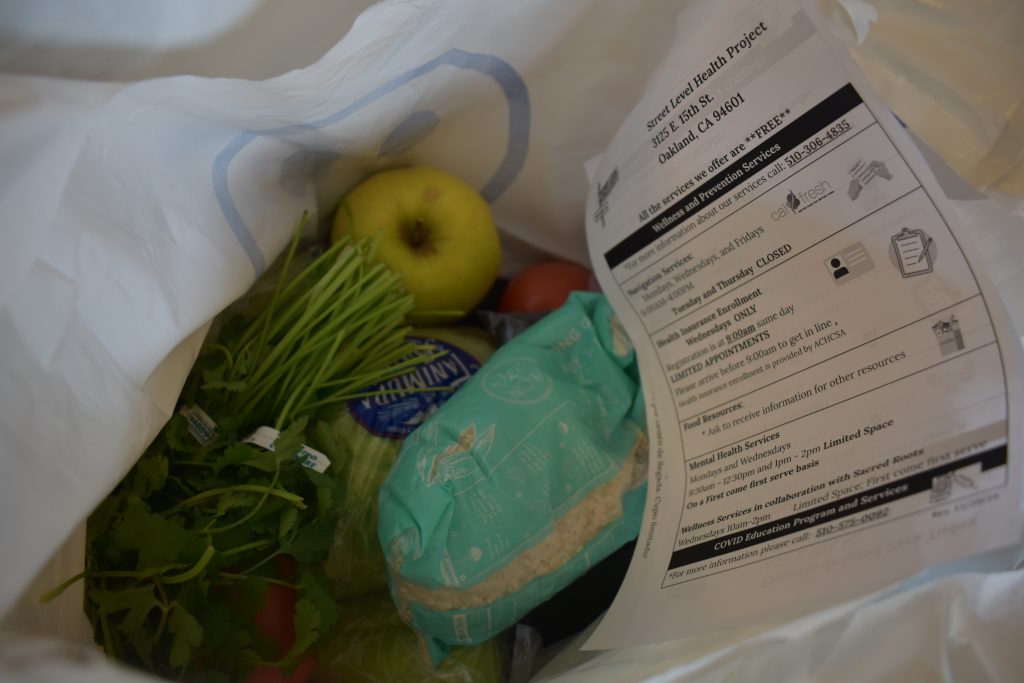Activism
Undocumented Workers Are Struggling to Feed Themselves. Slashed Budgets and New Immigration Policies Bring Fresh Challenges
Founded more than 20 years ago, Street Level Health Project started with a handful of nurses and volunteers visiting day laborer sites in East Oakland to provide medical assistance and other resources to newly arrived immigrants. They quickly spotted symptoms common among day laborers: nausea, fatigue, and headaches. Sitting in the sun for hours waiting for work is typical. Once on a job, some men shared incidents of nearly passing out while working. Volunteer nurses also noticed signs of hunger among the men, with some going days without eating a proper meal.

By Magaly Muñoz
Up and down the streets of the Fruitvale neighborhood in Oakland, immigrant workers head to empty parking lots and street corners waiting for a job. Some are as young as 14 and as old as 60.
Diego, a man in his late thirties, is a construction worker who arrived in the United States nine months ago. He, like many of the men standing beside him at the day laborer site, came to the U.S. in the hopes of providing a new life for his family. Now, Diego and other immigrants are worried as threats of deportation increase from the Trump administration.
Also worried are organizations such as Street Level Health Project, an Oakland-based nonprofit dedicated to providing access to health care and basic services to these laborers.
Street Level Health Project’s funding primarily comes from federal and local grants, These are in jeopardy because of city budget constraints and proposed cuts to federal social service dollars.
Already, the nonprofit’s local funding has been cut. The City of Oakland decreased one of the organization’s grants by $35,000 in one of its latest rounds of budget cuts, with city officials citing a looming budget deficit.
“Our primary day laborer program funding right now is secured, but we do have concerns in this next budget cycle if it will continue to be secured, given [the budget shortfall], and the recent cut to 13 community grants across the city,” said Executive Director Gabriela Galicia.
Founded more than 20 years ago, Street Level Health Project started with a handful of nurses and volunteers visiting day laborer sites in East Oakland to provide medical assistance and other resources to newly arrived immigrants. They quickly spotted symptoms common among day laborers: nausea, fatigue, and headaches. Sitting in the sun for hours waiting for work is typical. Once on a job, some men shared incidents of nearly passing out while working. Volunteer nurses also noticed signs of hunger among the men, with some going days without eating a proper meal.
“We’re the safety net to the safety net,” said Galicia. As Oakland’s sole organization devoted to helping undocumented workers, Street Level is often tasked with “picking up the leftovers” for groups that provide resources to the larger immigrant or underserved communities, she added. Now, that mission is under threat.

Level Health Project is a nonprofit organization in East Oakland that provides health and employment resources for immigrant day laborers and their families. The staff upped their efforts to provide information about immigration rights in the wake of Donald Trump’s presidency. Photo by Magaly Muñoz.
At day laborer sites in East Oakland, several workers said that they often skip buying groceries or meals for themselves in order to save money for rent or other necessities.
Diego, who like others interviewed for this story asked to not share his full name because of his undocumented status, said he’s lucky if he makes $300 a week. He said that is enough to pay for the small room he and his son rent in the Fruitvale – but not enough to feed them both. Diego said that he will sometimes go days without food.
The family Diego rents from is more fortunate, he said, because they’re able to afford meat and rice. At times, Diego said, it’s hard to ignore the savory smell that finds its way to his bedroom. Diego tells his son to look away from his landlord’s table to avoid feeling envious about what they cannot buy themselves.
“It’s hard because I know there’s food at the store, but there’s never enough [money] to buy it,” Diego said. “We barely have enough to pay our rent every month.”
On top of paying for the basics here in the U.S., day laborers also face pressure to support relatives in their home countries.
Pedro, interviewed on his BART ride home after an unsuccessful day of trying to find work in East Oakland, said his family in Guatemala regularly goes days without eating because he can’t make enough money in the Bay Area to send home to them.
“A lot of [day laborers] have their families back in [Latin America], making it harder to keep up with our needs here,” Pedro said. Some days he said the only thing he eats is the fruit that some local organizations hand out to workers like him.

Street Level Health Project is providing weekly grocery bags to immigrant day laborers and their families to address the growing need for food in the community. Photo by Magaly Muñoz.
Bracing for bigger challenges
Before the pandemic, Street Level Health Project had a hot meal lunch program at their central office in the Fruitvale, where the organization provided meals twice a week for over 50 people. The organization also had a hot meal breakfast program where they prepared 50 to 90 meals, three times a week.
Understanding the food insecurity that many day laborers face, the project launched a food distribution program in 2011, distributing nearly 70 bags of groceries weekly. Thanks to additional funding, they were able to increase that to 150 food bags a week during the pandemic.
In recent years, Street Level Health Project reduced its weekly grocery distribution back to 70 bags and cut its hot meal program completely. Galicia, the director, said that’s because of the end of COVID-19 funding and staffing reductions.
Street Level Health Project also receives regular donations from the Alameda County Food Bank, but Galicia said it has not been enough to restore the food distribution program to what it was during the pandemic.
Currently, Street Level has a $100,000 grant from the city of Oakland to provide wrap-around services for day laborers, such as getting jobs for the workers, providing assistance with CalFresh and MediCal applications, and referring people to legal aid or immigration assistance. Galicia said that funding is barely enough to do the amount of work that the city expects.
Meanwhile, the $35,000 cut in funding has impacted the organization’s workers’ rights outreach and education services, she said.
The Oakland Post tried reaching out to city and county officials several times for comment but did not get a response.
Galicia fears city leaders will make even harsher cuts during the upcoming budget cycle this spring to balance a $130 million shortfall. Last year, Oakland cut funding for public safety, arts and culture programs, and 13 other nonprofits that serve the city’s most vulnerable populations.
Yet the budget concerns don’t stop with local government.

In the wake of Trump 2.0, organizations across the country are handing out “red cards” with the rights that immigrants should be aware of when encountering immigration officers. Photo by Magaly Muñoz.
Since President Donald Trump’s second inauguration, immigrant communities and the organizations that serve them have been in crisis mode.
Trump, who ran on a promise to deport millions of immigrants, has signed executive orders to stop birthright citizenship, shipped migrants to Guantanamo Bay, and attempted to freeze federal funding to social programs. Undocumented residents are increasingly anxious that their families might get separated.
Galicia said this is the time for local and state governments to invest in their organizations’ staff and direct resources, not take them away, from the people on the frontlines.
“I think that it’s just as important that funders are able to give to our teams, not just for the community but because the people doing the work have to be well, and we need ample resources to be able to do this work to support our community,” Galicia said.
For Pedro, the day laborer in Oakland, the combination of less support from nonprofits like Street Level Health Project, along with fear raised by the Trump administration’s deportation threats, has left him fearful. He is not alone, he said. He has noticed fewer day laborers showing up to their usual spots. Pedro said he himself fears encountering an immigration officer on his way to work.
“We don’t want to leave our homes, but at the same time, if we don’t go outside, we don’t work,” he said. “If we don’t work, we can’t afford to live.”
Oakland Post reporter Magaly Muñoz produced this story as part of a series as a 2024 USC Annenberg Center for Health Journalism Data Fellow and Engagement Grantee.
Activism
Gov. Newsom Approves $170 Million to Fast Track Wildfire Resilience
AB 100 approves major investments in regional conservancies across the state, including over $30 million each for the Sierra Nevada, Santa Monica Mountains, State Coastal, and San Gabriel/Lower LA Rivers and Mountains conservancies. An additional $10 million will support wildfire response and resilience efforts.

By Bo Tefu
California Black Media
With wildfire season approaching, last week Gov. Gavin Newsom signed Assembly Bill (AB) 100, unlocking $170 million to fast-track wildfire prevention and forest management projects — many of which directly protect communities of color, who are often hardest hit by climate-driven disasters.
“With this latest round of funding, we’re continuing to increase the speed and size of forest and vegetation management essential to protecting communities,” said Newsom when he announced the funding on April 14.
“We are leaving no stone unturned — including cutting red tape — in our mission to ensure our neighborhoods are protected from destructive wildfires,” he said.
AB 100 approves major investments in regional conservancies across the state, including over $30 million each for the Sierra Nevada, Santa Monica Mountains, State Coastal, and San Gabriel/Lower LA Rivers and Mountains conservancies. An additional $10 million will support wildfire response and resilience efforts.
Newsom also signed an executive order suspending certain regulations to allow urgent work to move forward faster.
This funding builds on California’s broader Wildfire and Forest Resilience Action Plan, a $2.7 billion effort to reduce fuel loads, increase prescribed burning, and harden communities. The state has also launched new dashboards to keep the public informed and hold agencies accountable.
California has also committed to continue investing $200 million annually through 2028 to expand this effort, ensuring long-term resilience, particularly in vulnerable communities.
Activism
California Rideshare Drivers and Supporters Step Up Push to Unionize
Today in California, over 600,000 rideshare drivers want the ability to form or join unions for the sole purpose of collective bargaining or other mutual aid and protection. It’s a right, and recently at the State Capitol, a large number of people, including some rideshare drivers and others working in the gig economy, reaffirmed that they want to exercise it.

By Antonio Ray Harvey
California Black Media
On July 5, 1935, President Franklin D. Roosevelt signed into federal law the National Labor Relations Act (NLRA). Also known as the “Wagner Act,” the law paved the way for employees to have “the right to self-organization, to form, join, or assist labor organizations,” and “to bargain collectively through representatives of their own choosing, according to the legislation’s language.
Today in California, over 600,000 rideshare drivers want the ability to form or join unions for the sole purpose of collective bargaining or other mutual aid and protection. It’s a right, and recently at the State Capitol, a large number of people, including some rideshare drivers and others working in the gig economy, reaffirmed that they want to exercise it.
On April 8, the rideshare drivers held a rally with lawmakers to garner support for Assembly Bill (AB) 1340, the “Transportation Network Company Drivers (TNC) Labor Relations Act.”
Authored by Assemblymembers Buffy Wicks (D-Oakland) and Marc Berman (D-Menlo Park), AB 1340 would allow drivers to create a union and negotiate contracts with industry leaders like Uber and Lyft.
“All work has dignity, and every worker deserves a voice — especially in these uncertain times,” Wicks said at the rally. “AB 1340 empowers drivers with the choice to join a union and negotiate for better wages, benefits, and protections. When workers stand together, they are one of the most powerful forces for justice in California.”
Wicks and Berman were joined by three members of the California Legislative Black Caucus (CLBC): Assemblymembers Tina McKinnor (D-Inglewood), Sade Elhawary (D-Los Angeles), and Isaac Bryan (D-Ladera Heights).
Yvonne Wheeler, president of the Los Angeles County Federation of Labor; April Verrett, President of Service Employees International Union (SEIU); Tia Orr, Executive Director of SEIU; and a host of others participated in the demonstration on the grounds of the state capitol.
“This is not a gig. This is your life. This is your job,” Bryan said at the rally. “When we organize and fight for our collective needs, it pulls from the people who have so much that they don’t know what to do with it and puts it in the hands of people who are struggling every single day.”
Existing law, the “Protect App-Based Drivers and Services Act,” created by Proposition (Prop) 22, a ballot initiative, categorizes app-based drivers for companies such as Uber and Lyft as independent contractors.
Prop 22 was approved by voters in the November 2020 statewide general election. Since then, Prop 22 has been in court facing challenges from groups trying to overturn it.
However, last July, Prop 22 was upheld by the California Supreme Court last July.
In a 2024, statement after the ruling, Lyft stated that 80% of the rideshare drivers they surveyed acknowledged that Prop 22 “was good for them” and “median hourly earnings of drivers on the Lyft platform in California were 22% higher in 2023 than in 2019.”
Wicks and Berman crafted AB 1340 to circumvent Prop 22.
“With AB 1340, we are putting power in the hands of hundreds of thousands of workers to raise the bar in their industry and create a model for an equitable and innovative partnership in the tech sector,” Berman said.
Activism
California Holds the Line on DEI as Trump Administration Threatens School Funding
The conflict began on Feb. 14, when Craig Trainor, acting assistant secretary for civil rights at the U.S. Department of Education (DOE), issued a “Dear Colleague” letter warning that DEI-related programs in public schools could violate federal civil rights law. The letter, which cited Title VI of the Civil Rights Act and the 2023 Supreme Court ruling in Students for Fair Admissions v. Harvard, which ended race-conscious admissions, ordered schools to eliminate race-based considerations in areas such as admissions, scholarships, hiring, discipline, and student programming.

By Joe W. Bowers Jr
California Black Media
California education leaders are pushing back against the Trump administration’s directive to dismantle diversity, equity, and inclusion (DEI) programs in its K-12 public schools — despite threats to take away billions in federal funding.
The conflict began on Feb. 14, when Craig Trainor, acting assistant secretary for civil rights at the U.S. Department of Education (DOE), issued a “Dear Colleague” letter warning that DEI-related programs in public schools could violate federal civil rights law. The letter, which cited Title VI of the Civil Rights Act and the 2023 Supreme Court ruling in Students for Fair Admissions v. Harvard, which ended race-conscious admissions, ordered schools to eliminate race-based considerations in areas such as admissions, scholarships, hiring, discipline, and student programming.
According to Trainor, “DEI programs discriminate against one group of Americans to favor another.”
On April 3, the DOE escalated the pressure, sending a follow-up letter to states demanding that every local educational agency (LEA) certify — within 10 business days — that they were not using federal funds to support “illegal DEI.” The certification requirement, tied to continued federal aid, raised the stakes for California, which receives more than $16 billion annually in federal education funding.
So far, California has refused to comply with the DOE order.
“There is nothing in state or federal law that outlaws the broad concepts of ‘diversity,’ ‘equity,’ or ‘inclusion,’” wrote David Schapira, California’s Chief Deputy Superintendent of Public Instruction, in an April 4 letter to superintendents and charter school administrators. Schapira noted that all of California’s more than 1,000 traditional public school districts submit Title VI compliance assurances annually and are subject to regular oversight by the state and the federal government.
In a formal response to the DOE on April 11, the California Department of Education, the State Board of Education, and State Superintendent of Public Instruction Tony Thurmond collectively rejected the certification demand, calling it vague, legally unsupported, and procedurally improper.
“California and its nearly 2,000 LEAs (including traditional public schools and charter schools) have already provided the requisite guarantee that its programs and services are, and will be, in compliance with Title VI and its implementing regulation,” the letter says.
Thurmond added in a statement, “Today, California affirmed existing and continued compliance with federal laws while we stay the course to move the needle for all students. As our responses to the United States Department of Education state and as the plain text of state and federal laws affirm, there is nothing unlawful about broad core values such as diversity, equity and inclusion. I am proud of our students, educators and school communities who continue to focus on teaching and learning, despite federal actions intended to distract and disrupt.”
California officials say that the federal government cannot change existing civil rights enforcement standards without going through formal rule-making procedures, which require public notice and comment.
Other states are taking a similar approach. In a letter to the DOE, Daniel Morton-Bentley, deputy commissioner and counsel for the New York State Education Department, wrote, “We understand that the current administration seeks to censor anything it deems ‘diversity, equity & inclusion.’ But there are no federal or State laws prohibiting the principles of DEI.”
-

 Activism4 weeks ago
Activism4 weeks agoOakland Post Endorses Barbara Lee
-

 Activism4 weeks ago
Activism4 weeks agoOakland Post: Week of April 2 – 8, 2025
-

 Activism3 weeks ago
Activism3 weeks agoOakland Post: Week of April 9 – 15, 2025
-

 #NNPA BlackPress3 weeks ago
#NNPA BlackPress3 weeks agoTrump Profits, Black America Pays the Price
-

 #NNPA BlackPress3 weeks ago
#NNPA BlackPress3 weeks agoHarriet Tubman Scrubbed; DEI Dismantled
-

 #NNPA BlackPress3 weeks ago
#NNPA BlackPress3 weeks agoNew York Stands Firm Against Trump Administration’s Order to Abandon Diversity in Schools
-

 #NNPA BlackPress3 weeks ago
#NNPA BlackPress3 weeks agoTrump Targets a Slavery Removal from the National Museum of African-American History and Culture
-

 #NNPA BlackPress4 weeks ago
#NNPA BlackPress4 weeks agoLawmakers Greenlight Reparations Study for Descendants of Enslaved Marylanders






















































